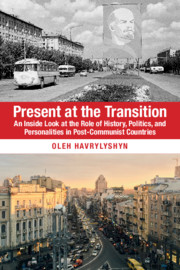 Present at the Transition
Present at the Transition Book contents
- Present at the Transition
- Present at the Transition
- Copyright page
- Dedication
- Contents
- Figures
- Tables
- Preface
- Acknowledgments
- Abbreviations
- Introduction
- Part I The Diverse Paths Taken in Transition
- Part II Choice of Strategy
- 3 Historical Legacies
- 4 Reform Commitment of Political Leaders and Populations
- 5 The Role of Technocrats
- 6 External Incentives and Pressures
- Part III Domestic Vested Interests and Reforms
- Part IV Outcomes and Prospects
- Bibliography
- Index
4 - Reform Commitment of Political Leaders and Populations
from Part II - Choice of Strategy
Published online by Cambridge University Press: 04 May 2020
- Present at the Transition
- Present at the Transition
- Copyright page
- Dedication
- Contents
- Figures
- Tables
- Preface
- Acknowledgments
- Abbreviations
- Introduction
- Part I The Diverse Paths Taken in Transition
- Part II Choice of Strategy
- 3 Historical Legacies
- 4 Reform Commitment of Political Leaders and Populations
- 5 The Role of Technocrats
- 6 External Incentives and Pressures
- Part III Domestic Vested Interests and Reforms
- Part IV Outcomes and Prospects
- Bibliography
- Index
Summary
The old debate in history on how much individual leaders matter compared to underlying forces that move things is explored in this chapter for the post-communist transition episode. Key leaders in Central Europe, like Havel and Klaus in Czechoslovakia, and Wałęsa, Mazowiecki, and Balcerowicz in Poland, may have had the historical force of a return to prewar Europe behind them, but it was their strong commitment that resulted in seizing the opportunity of 1989’s critical juncture and moving fast to consolidate Big Bang reforms before old and new vested interests could capture the process. In Bulgaria, Romania, and even more so farther east, remnants of the old elite did not have this commitment and used the excuse of historical inertia to slow the process to their personal benefit. The best example of this was the almost complete lack of reforms in the three years of Kravchuk’s presidency in Ukraine. Some exceptions on both sides existed – Slovakia and Serbia hesitated despite the European heritage, while Yeltsin in Russia without this incentive initially tried to leverage this critical juncture into real reforms led by a capable and committed reformer Gaidar – the power of the old-guard interest soon led to aborting this Big Bang effort.
Keywords
- Type
- Chapter
- Information
- Present at the TransitionAn Inside Look at the Role of History, Politics, and Personalities in Post-Communist Countries, pp. 83 - 103Publisher: Cambridge University PressPrint publication year: 2020
